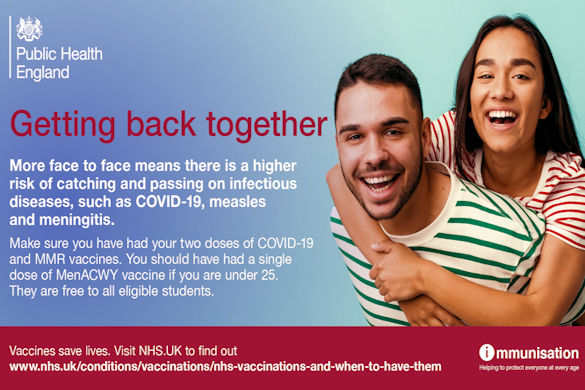
There are a number of vaccinations, including protection against COVID-19, which are on offer to those in our university community.
COVID-19 vaccinations
Everyone aged 5 and over can get a 1st and 2nd dose of the COVID-19 vaccine. People aged 16 and over can also get a booster dose no earlier than three months after their previous dose.
If you have not received three doses of the COVID-19 vaccine you can still catch up now.
Being fully vaccinated can help:
- reduce your risk of getting seriously ill from COVID-19
- reduce your risk of catching or spreading COVID-19
- protect against COVID-19 variants
COVID-19 vaccinations and boosters can be booked directly on the NHS website.
Students can book their appointment at one of the vaccination centres, a community pharmacy or at some select GP sites by visiting the National Booking Service website or by phoning the NHS on 119. There are also vaccination drop-in sessions available in the city. There is no need to book for these sessions. Details of all drop-in sessions in Liverpool can be found on the CCG website.
If you wish to receive the vaccine you will need to be registered with a GP, so it is important to do this as soon as possible, if you haven’t already. You can register with our local practice here. If you have previously received NHS treatment you can find your NHS number by using this tool.
HPV (human papilloma virus) vaccine
Female students rom the UK should have been offered 2 doses of HPV vaccine in Year 8 or Year 9 when aged 13 to 15 years at school. HPV vaccine protects against the human papilloma virus that causes most cervical cancers and some anal, genital, mouth and throat (head and neck) cancers. It also offers protection against the most common genital warts caused by HPV.
Any female student who missed one or both doses of their HPV vaccine is eligible to receive this up to their 25th birthday and you can contact your GP to arrange to receive this free of charge.
Find out more about the HPV vaccine on the NHS webpages.
Measles, Mumps and Rubella (MMR) vaccination
The MMR vaccination is also part of the UK schools programme, so most UK-based students will have received this.
However, if you have not been vaccinated against mumps, measles and rubella – or you are not sure – it is important you contact your GP and arrange to receive the vaccines.
You can visit your usual GP to arrange this before you move to Liverpool, or you can arrange to have the vaccination free of charge by registering with a GP in Liverpool. You can register with our local practice here.
Meningococcal ACWY (Meningitis) vaccination
Most students from the UK have been vaccinated with the Meningitis ACWY immunisation as part of the UK schools programme. However, if you have not been vaccinated against mumps, measles and rubella, or meningitis – or you are not sure – it is important you contact your GP and arrange to receive the vaccines.
You can visit your usual GP to arrange this before you move to Liverpool, or you can arrange to have the vaccination free of charge by registering with a GP in Liverpool. You can register with our local practice here.
Please make sure you familiarise yourself with the symptoms of meningitis, measles, mumps and rubella via the NHS website.
Monkeypox
Monkeypox is a rare infection most commonly found in west or central Africa. There has recently been an increase in cases in the UK, but the risk of catching it is low.
Monkeypox is caused by a similar virus to smallpox. The smallpox (MVA) vaccine should give a good level of protection against monkeypox and is being offered by the NHS to people who are most likely to be exposed to monkeypox.
Your local NHS services will contact you and offer you a vaccine if you are at risk of exposure. You may also be offered the vaccine alongside other appointments, for example for HIV pre-exposure prophylaxis (PrEP).
People who are most likely to be exposed include:
- healthcare workers caring for patients with confirmed or suspected monkeypox
- men who are gay, bisexual or have sex with other men, and who have multiple partners, participate in group sex or attend sex on premises venues (staff who work in these premises may also be eligible)
- people who’ve been in close contact with someone who has monkeypox – ideally they should have the vaccine within 4 days of contact, but it can be given up to 14 days after
Find out more about the smallpox vaccine for monkeypox on GOV.UK.
Find out more about the signs and symptoms of monkeypox on the NHS webpages.